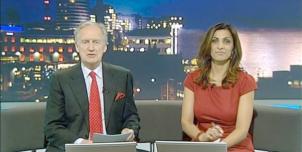Full Freeview on the The Wrekin (Telford and Wrekin, England) transmitter
| Google Streetview | Google map | Bing map | Google Earth | 52.670,-2.552 or 52°40'13"N 2°33'6"W | TF6 5AH |
The symbol shows the location of the The Wrekin (Telford and Wrekin, England) transmitter which serves 280,000 homes. The bright green areas shown where the signal from this transmitter is strong, dark green areas are poorer signals. Those parts shown in yellow may have interference on the same frequency from other masts.
_______
Digital television services are broadcast on a multiplexes (or Mux) where many stations occupy a single broadcast frequency, as shown below.
64QAM 8K 3/4 27.1Mb/s DVB-T MPEG2
H/V: aerial position (horizontal or vertical)
The The Wrekin (Telford and Wrekin, England) mast is a public service broadcasting (PSB) transmitter, it does not provide these commercial (COM) channels: .
If you want to watch these channels, your aerial must point to one of the 80 Full service Freeview transmitters. For more information see the will there ever be more services on the Freeview Light transmitters? page.
Which Freeview channels does the The Wrekin transmitter broadcast?
If you have any kind of Freeview fault, follow this Freeview reset procedure first.Digital television services are broadcast on a multiplexes (or Mux) where many stations occupy a single broadcast frequency, as shown below.
64QAM 8K 3/4 27.1Mb/s DVB-T MPEG2
H/V: aerial position (horizontal or vertical)
The The Wrekin (Telford and Wrekin, England) mast is a public service broadcasting (PSB) transmitter, it does not provide these commercial (COM) channels: .
If you want to watch these channels, your aerial must point to one of the 80 Full service Freeview transmitters. For more information see the will there ever be more services on the Freeview Light transmitters? page.
Which BBC and ITV regional news can I watch from the The Wrekin transmitter?

BBC Midlands Today 2.9m homes 10.9%
from Birmingham B1 1RF, 49km east-southeast (116°)
to BBC West Midlands region - 66 masts.

ITV Central News 2.9m homes 10.9%
from Birmingham B1 2JT, 49km east-southeast (116°)
to ITV Central (West) region - 65 masts.
All of lunch, weekend and 80% evening news is shared with Central (East)
How will the The Wrekin (Telford and Wrekin, England) transmission frequencies change over time?
| 1984-97 | 1997-98 | 1998-2011 | 2011-13 | 27 Feb 2018 | |||||
| A K T | A K T | A K T | W T | K T | |||||
| C23 | ITVwaves | ITVwaves | ITVwaves | D3+4 | D3+4 | ||||
| C26 | BBC1waves | BBC1waves | BBC1waves | BBCA | BBCA | ||||
| C29 | C4waves | C4waves | C4waves | ||||||
| C30 | -BBCB | BBCB | |||||||
| C33 | BBC2waves | BBC2waves | BBC2waves | ||||||
| C35 | C5waves | C5waves | |||||||
| C41 | +SDN | SDN | |||||||
| C44 | ArqA | ArqA | |||||||
| C47 | ArqB | ArqB | |||||||
| C48 | _local | _local | |||||||
| C51tv_off | _local |
tv_off Being removed from Freeview (for 5G use) after November 2020 / June 2022 - more
Table shows multiplexes names see this article;
green background for transmission frequencies
Notes: + and - denote 166kHz offset; aerial group are shown as A B C/D E K W T
waves denotes analogue; digital switchover was 6 Apr 11 and 20 Apr 11.
How do the old analogue and currrent digital signal levels compare?
| Analogue 1-5 | 100kW | |
| BBCA, D3+4, BBCB | (-7dB) 20kW | |
| SDN, ARQA, ARQB | (-10dB) 10kW | |
| Mux 1*, Mux 2*, Mux A*, Mux B* | (-17dB) 2kW | |
| Mux C*, Mux D* | (-20dB) 1000W |
Which companies have run the Channel 3 services in the The Wrekin transmitter area
|
|
Is the transmitter output the same in all directions?
Radiation patterns withheldThursday, 7 April 2011
M
Mike Dimmick9:45 PM
Reading
Steve: Yes, that's correct.
On the 20th, D3&4 goes up to 20k and moves to C23. Mux B closes (services have already transferred to BBC A, except Sky Sports which go to ArqB on the 20th). The HD services, which replace it but on C30, start at 20k.
Mux A takes over Mux 2's frequencies of C31 and C49, staying at 2kW. Mux D becomes ArqB, takes over Mux C's channel and doubles to 2 kW, while Mux C becomes ArqA on Mux D's channel but stays on 1 kW. Some people may lose channels on Mux C because of this.
On 28 September, the commercial multiplexes go to the channels and power levels listed above, once Sutton Coldfield has finished with them.
| link to this comment |
Mike's: mapM's Freeview map terrainM's terrain plot wavesM's frequency data M's Freeview Detailed Coverage
Friday, 8 April 2011
S
steve12:45 AM
Wrexham
Mike - Thanks. That is clear. er. ish.
Bit like the soft mutation in Welsh. Or the Balkan Question.
A slightly simplistic question. Why does it make sense to broadcast some channels at 20kW and others at 2kW or 1kW?
Is it coz some is 64QAM and some only 16? Will my set-top ae find them equally receptionable?
I have tonight found that I get usable ITV if the loop Ae faces not quite the right direction!
| link to this comment |
steve's: mapS's Freeview map terrainS's terrain plot wavesS's frequency data S's Freeview Detailed Coverage
S
steve12:49 AM
Wrexham
Phil Williams - where in Wrexham? Down here in Chirk - 10mls south and over the crest of a hill - we are firmly in Central TV and BBC Midlands (wherever the midlands are).
But Wrexham proper surely uses mainly Manchester/Grenada TV? I certaily would if I could.
I have even heard that there are TV signals in Welsh, but we know them not.
| link to this comment |
steve's: mapS's Freeview map terrainS's terrain plot wavesS's frequency data S's Freeview Detailed Coverage
M
Mike Dimmick8:48 AM
steve: Last week Mux 1 was at 2 kW, on two different channels depending on whether you were west or east of the transmitter.
Each multiplex has had different levels over the years. The oldest capture archived by WaybackMachine.org is from February 2001, which shows kW on all multiplexes.
The levels were originally set very low because of fears of damage to analogue reception, particularly at the relays. As the damage was not as bad as had been believed, they increased the digital power, changed channels, changed radiation patterns, to improve coverage (some analogue relays were increased in power to compensate, I believe). Some sites like The Wrekin got additional aerials and channels where they couldn't find one set of channels to cover the whole area.
Still, digital has never had the power necessary to match the analogue coverage. The only way to get there is to convert fully - turn off analogue and all the clashes go away, so you can increase digital power up to equal or even greater coverage.
Doing it in two stages is a political choice, so as to give people fair warning that it's about to go and give them some extra time to get sorted out before everything disappears.
The analogue network was planned to provide four networks from the start, so reducing that to three PSB multiplexes is really not a problem. Generally the three PSBs get channels previously used for analogue - BBC A takes BBC One's old channel, D3&4 replaces ITV1. Here, BBC B has a different channel but this is due to releasing channels 31-38.
Fitting in the COM multiplexes is more tricky - six into four doesn't go. They have to go wherever space can be found and often at lower power, costing some coverage. The PSBs are required to meet analogue's 98.5% coverage. The COMs are expected to get 90.5%. They don't really care about that last 8% - they turned down the option to use any additional sites.
As for 16QAM 3/4 vs 64QAM 2/3: the plan was always to use 64QAM and all muxes used that mode from 1998 to 2002. The BBC originally ran a line-up on Mux 1 similar to what is now on BBC A. When ITV Digital went into administration, one of the conditions of the new licences was a mode change to improve coverage. However, the multiplexes granted by law rather than by auction (mux 1, 2 and A) were not compelled to make the change. The BBC did, ITV and S4C didn't, we had a mix of modes for the next six to ten years.
(S4C? Yes. SDN stood for S4C Digital Networks. They flogged it to ITV plc in 2005.)
2001 power levels:
DTT Channel Allocation - The Midlands
'Equalization programme' details from 2001:
DTG :: Page not found plans for increases in 2002 (not all of these happened):
http://www.ofcom.org.uk/s….doc
Post 2002 changes: DTT Transmitting Station alterations (RG47SH)
| link to this comment |
Saturday, 9 April 2011
A
A Smith7:28 PM
I have retuned the freeview box on 6th April as instructed - all channels coming through except BBC 1 and 2 - the strange thing is that on tuning I get BBC 1 and 2 for a short time and then lose them? I am in Shrewsbury and receive the Wrekin signal. Whats goin on? I have tried to retune manually but it says that teh service in not available?
| link to this comment |
Sunday, 10 April 2011
S
steve2:05 PM
A Smith - I presume you can't get any of the Mux PSB1/BBCA - as listed here Freeview on The Wrekin TV transmitter | ukfree.tv - independent free digital TV advice .
You are very close to the Wrekin - could be too much power! Are you using an amplifier? If so, remove or depower it. (LL145HD)
| link to this comment |
Monday, 11 April 2011
T
T E Badham8:42 PM
Will you have BBC & ITV HD Channels and if so when
| link to this comment |
Tuesday, 12 April 2011
T E Badham: From The Wrekin, Wednesday 20th April 2011, ie next week.
| link to this comment |
A
Alan Smith9:30 AM
I have been working hard retuning sets/boxes for people since Wrekin and Ridge hill had the first of thier retune days, and am not looking forward to the next!
Most of my work is done in Cleobury Mortimer (DY14 8..)where around 90% of properties receive from Sutton, with the others spread between Wrekin and Ridge Hill.
In some places the signal strength is very similar from sutton or wrekin, and there is around 90degrees difference in direction.
When Wrekin start transmitting on channels 41, 44, and 47, what effect will that have on the Mux's from Sutton already using 41, 44, and 47? As we will be recieving 2 different signals on the same frequency, will the decoder cope?, or, are we going to lose half our freeview services between 20 April and 21 September?
| link to this comment |
K
KMJ,Derby11:03 AM
Alan Smith: The COM muxes from The Wrekin do not use their high power post switchover frequencies until 28th September 2011, after Sutton Coldfield has switched.
| link to this comment |
Select more comments
Your comment please!




